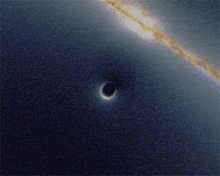OK, not really. :)
This morning, I read this:
http://www.bbc.com/earth/story/20150602-how-will-the-universe-end
I find the science behind this kind of exploration fascinating. Although, in order to be proved correct, one must exist at the end of the Universe to experience one of the posited phenomena, which would be impossible. So, there's no way to know - in the same way that there's no way to know what happened at the beginning. It's all just very interesting speculation.
One of the aspects of these theories that interests me is the idea of "dark matter" and/or "dark energy." The very definition of the stuff implies our inability to perceive or measure it, or interact with it in any way. But here's my question - if dark matter exists in the quantities they're saying it does, how is it that any other type of matter exists and can be perceived? Wouldn't the dark matter get in the way? Or perhaps it's bending the perceivable world around it, like the star which bends the light from the galaxy behind it to form a halo:
In this fashion:
Apparently, dark matter has a very weak gravitational field and therefore doesn't interact with the rest of the Universe in the same way that other matter does. Which is a little convenient... I mean, I realize this is all theoretical, and that because dark matter is not available for questioning, as it were, there's no way to get answers from it. It feels a bit like a cop-out, though - hey! there's something we can't understand, so let's invent something that will help explain our observations and fill in the gaps in our understanding/equations. Or, perhaps - there's something going on in nature that we can't fully understand. In order to try to understand it, let's invent a new kind of matter/energy to satisfy our equations.
It's not a little unlike how many world religions began. And persist. Attributing a supernatural explanation to otherwise inexplicable phenomena has been the realm of religious theory since people learned to make such attributions.
I personally believe in a world of both vast amounts of unknown phenomena and reasonable explanations for said phenomenon. I don't believe that there is anything unknowable. And I believe that religion and science are not opposites, but complimentary. All knowledge and truth exists, whether we attribute it to supernatural (or not currently understood) means, or whether we can measure, define, predict, and thus understand it.


Comments